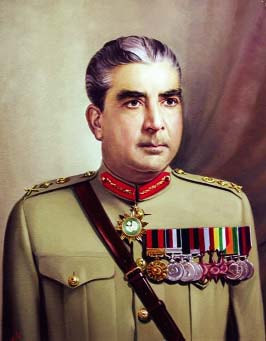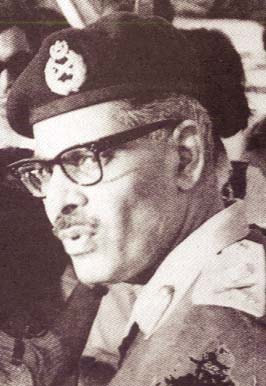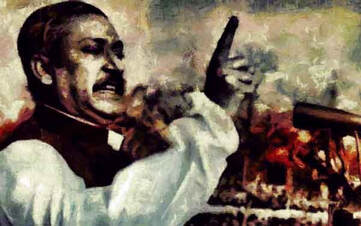‘Tragedy of Errors: East Pakistan Crisis’ is a book written by Lt Gen Kamal Matinuddin. This was first published by Wajidalis Publisher of Pakistan. In this month of March, we present the views of a senior Pakistani officer where he depicted the cruel planning and execution of Operation Searchlight-the crackdown of 25th March 1971 upon the unarmed Bangladeshi people…
Operation BLITZ
Lieutenant General Sahibzada Yaqub Khan, commander of the Eastern Theatre had, in February, 1971, prepared plans for dealing with an insurgency situation in East Pakistan. The plan was code-named OPERATION BLITZ. He was, however aware that a military action alone was not the solution to the political impasse. “I need hardly mention that operation BLITZ will not and should not be an end in itself but must be followed immediately by the projection of political and economic progress at the national level. Such a course would be an essential sequel to this fire brigade action for the wheel would only then be turned full circle” wrote Yaqub to Yahya.
Law and Order Situation Worsens
The situation in East Pakistan after the postponement of the national assembly session was fast deteriorating Sheikh Mujibur Rahman had given the call for a virtual take over of the administration of the province by his supporters which, by now, included almost all politicians, the majority of bureaucrats and large number of the members of the Bengali elements in the armed forces besides the entire Bengali civil population.

Although all the personalities interviewed at Dacca categorically denied that the militants of the Awami League massacred the non-Bengalis even before the military crackdown by the Pakistan army, however, there was ample evidence to prove that they went on a rampage as soon as the announcement postponing the national assembly session was made on March 1. The scene immediately prior to the proposed military action was of complete disorder and total disregard of governmental authority.
General Yahya had by then lost complete faith in his military commanders in the Eastern theatre. “A first class army in East Pakistan is completely demoralized because of two old women” remarked the President to General Tikka Khan. Implying that if a firm action had been taken earlier things would not have gone out of hand. General Tikka, known for his blind obedience to orders, would, he was certain, be able to put the train back on the rails by sheer use of force.
There were only two alternatives at that stage. Order the army to restore the authority of the government or hand over powers to the majority party.
The military junta was split on the question of suppressing the insurgency by a military action. Those in East Pakistan were not in favour of it as they had been witnessing the growing popularity of the Awami League in that province. They knew that even after eliminating the die-hard secessionist the movement in favour of the 6-Points formula would not die down. They were concerned about the mass killings on both sides which were bound to follow once the army was given a free hand to deal with all those elements which had bottled them up and were humiliating them at every corner.
Those in West Pakistan particularly the well known hawks Major General A. O. Mitha, (Quarter Master General), Khuda Dad, (Adjutant General), Iftikhar Janjua (Master General Ordance) and Ghulam Umar, (Chief of the National Security Council) were advocating a strong military action. The ISIwanted outright and ruthless military action and said Sahibzada Yaqub Khan. “ No commander should be afraid to be called a butcher if that is the demand of the hour” was General Akber’s idea for dealing with the prevailing situation. In fact both General Khadim Hussein Raja and General Rao Farman Ali felt that the principal staff officers (PSO’s) from GHQ, who had descended on Dacca just prior to the proposed military action, had been sent to take over from them if they hesitated to use military force to restore normalcy. “Mitha, Khuda Dad and Janjua were sent as others and I may decline to take action” confided General Raja to the author. He emphasized that before this no PSO had ever visited East Pakistan.

Operation SEARCH LIGHT
The military authorities in East Pakistan were completely ignored during the political negotiations which had begun in Dacca on March 15. When Raja asked Tikka as to how the negotiations were going on he replied by saying “you know as much as I do – we both read the newspapers.” But Tikka, a practical soldier, wanted to be prepared for the worst. He had seen the anger and hatred in the eyes of the Bengalis against the army East Bengal. He did not want to be caught unawares by a preemptive action by the militant wing of the Awami League. General Yahya had already given him a hint that force may have to be used if no positive result is achieved through talks.
He therefore, as early as March 15, told General Officer Commanding 14 Division to be prepared if negotiations failed. On March 16, Tikka called Raja and Farman and directed them to prepare contingency plans for a military action to restore the authority of the government. This was not to be an ordinary aid to civil power but it was to be an action to suppress a revolt against an established authority said Raja while explaining the details of the military plan to deal with the situation that would arise if the political negotiations failed.
On March 17, Raja and Farman met. They were colleagues at the command and staff college and were experienced hands in writing appreciations at the highest level. They divided their task into two parts. While Farman wrote the assessment of the situation Raja drafted the tasks of the subordinate formation. On March 19, the plan for a military action against dissidents and secessionists was presented to General Tikka and General Abdul Hamid, the COS. It was accepted in to recalls General Raja. General Hamid wanted to ensure complete security of the plans and told Raja that the contents were not to be disclosed except on a strictly need-to-know basis. Sector commanders only, therefore, were taken into confidence.
The decision for suppressing the insurgency in East Pakistan by military force, if it becomes necessary, was made on March 22, 1971 at a meeting between the President, the governor and the martial law administrator at Dacca. No party leader opposed the use of force to re-instate the government’s authority. O(n March 23, Pakistan’s National Day, Dacca wore a grim look. Instead of the Pakistani parcham (fiag) black flags fluttered on every house and vehicle. On the afternoon of March 23, when Dacca had given its unanimous vote against a United Pakistan the armed forces chiefs also conveyed their recommendation of a military actions. Yahya cleared the emergency plan to restore law and order on that very day.
However, it was not till March 24, that the final decision to crush the Awami League and its supporters was taken.
Yahya called General Tikka Khan and Major General Rao Farman and asked them to finalise the operation order for OPERATION SEARCH LIGHT. The plan prepared earlier by Farman and Raja was given the final touches. “The killing of a few thousand would not be too high a price for keeping the country together. Show them the teeth and they will be quiet”. Said Yahya.

